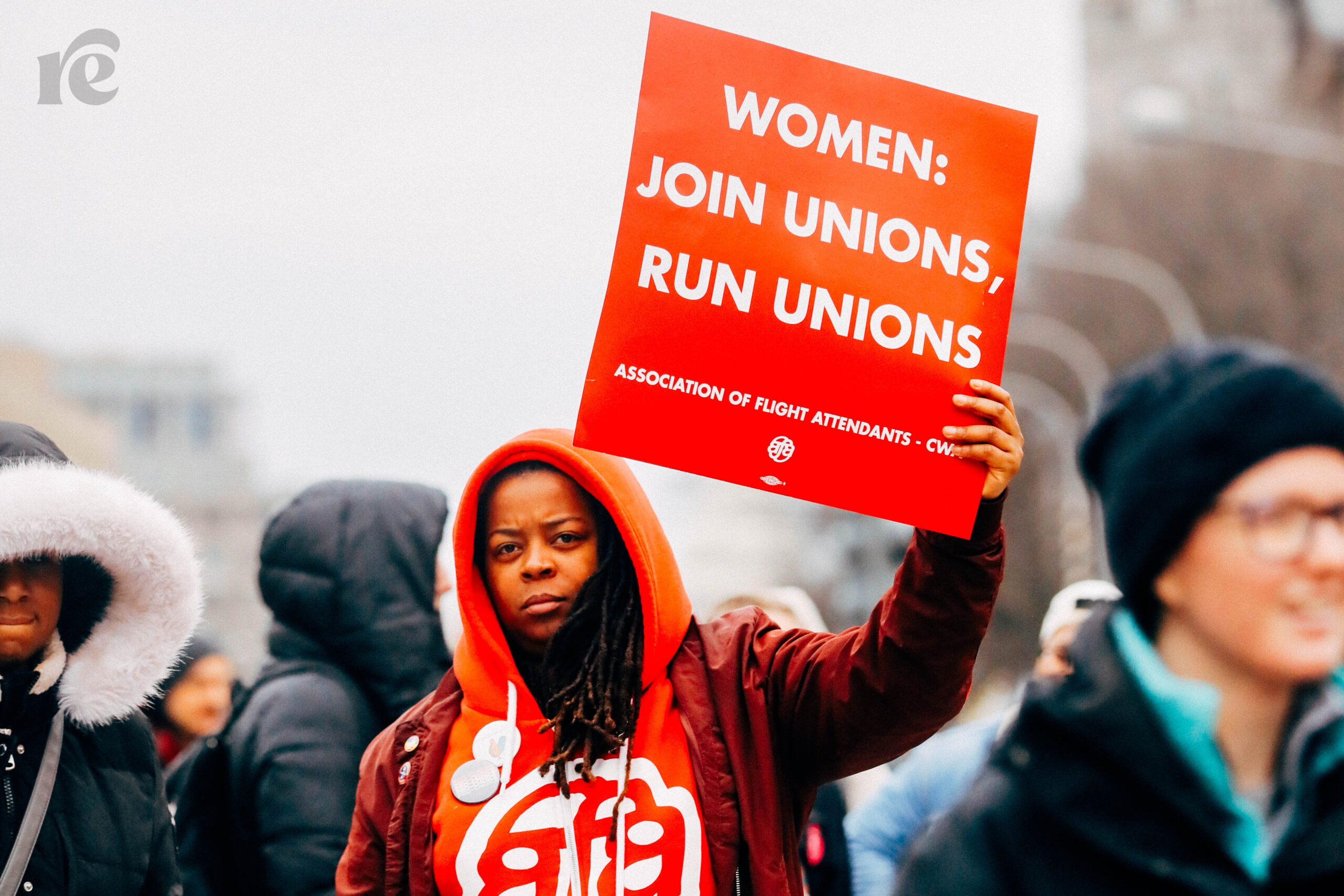When Will Abortion Workers Get Their Hot Union Summer?
Repro workers are exhausted; "burned out" isn't strong enough. And what are they getting in return? Union busting, layoffs, and poverty wages.

The actual season may be ending, but hot union summer lives on.
Last week, United Auto Workers initiated a simultaneous strike against all “big three” U.S. automakers for the first time in the union’s history. About 13,000 workers are on strike.
The Writers Guild of America and Screen Actors Guild and American Federation of Television and Radio Artists are still in the midst of one of the most high-profile strikes in recent memory, thanks in part to those unions’ famous members and the cultural impact of work stoppages in film and TV.
Earlier in the summer, UPS was so (rightfully) scared of its drivers going on strike that the UPS Teamsters won a historic contract, including significant raises and the end of an unfair, two-tiered wage system.
Throughout the year, the New York State Nurses Association has won multiple major fights against big, powerful hospital systems—particularly significant victories as burnout among health-care workers reaches crisis levels.
Freelance workers, who lack many of the protections of traditional employees, are getting in on the action, too. Thanks in large part to the organizing of the Freelance Solidarity Project of the National Writers Union—full disclosure: I’m a member—freelance workers across all industries are now broadly guaranteed contracts and timely payment in New York City, Los Angeles, and Columbus, Ohio. (As a staff member at Rewire News Group, I am also a member of the Washington-Baltimore News Guild. Double union girlie here.)

Recently, Illinois became the first state to adopt these protections for freelancers. (It could have been New York, but Gov. Kathy Hochul vetoed our Freelance Isn’t Free law last year; it passed in the legislature again this session, and we’re waiting on her to sign it before the end of the year. Hello, Kathy. Are you listening?)
Fewer Americans are union members than at any other time in history, but with more people becoming aware of the benefits of union membership, and the most pro-worker National Labor Relations Board we’ve seen in a very long time, the tide may finally be turning.
For employers who want their workers to be happy, healthy, and have what they need to thrive, the next step in this moment is actually very simple: They should voluntarily recognize their employees’ unions and bargain with them in good faith.
But many employers—particularly those that claim to espouse progressive values—are outright refusing to do this. Nowhere is that hypocrisy on greater display than in the reproductive health, rights, and justice field.
Repro workers are exhausted. “Burnout” isn’t a strong enough word. They’re carrying so much: the need to have an encyclopedic knowledge of laws across multiple states; the threat of imprisonment or costly lawsuits if they run afoul of some of those laws; the constant, looming possibility that they could lose their jobs at any time either because of abortion bans or because a shoestring budget got stretched too far; overwork and understaffing; and most of all, the trauma of living through, and watching patients suffer as the result of, a human rights crisis.
And what are they getting in return? Union busting, layoffs, and poverty wages.
To name just a few examples: Planned Parenthood Federation of America (PPFA) announced significant layoffs this summer, and union busting is so common among its affiliates—and has been a pattern for so long—that it’s difficult to believe it’s not an institutional policy, no matter how much PPFA insists that affiliates make their own decisions.
Frontline workers bear the brunt of much of this injustice, but advocacy organizations treat their staff just as badly—if not worse, in some cases. Allegations of a hostile work environment have long dogged the Guttmacher Institute, one of the most important research organizations in reproductive health. Just last week, the “abortion justice” organization All* Above All fired almost its entire nonexecutive staff weeks after an anonymous employee or employees alleged anti-Blackness within the organization.
Weeks after staffers wrote an anonymous post detailing anti-Blackness in the org, @AllAboveAll announced a "restructuring" today. Here's the official press release, but every staffer has been laid off who's not on the executive team or a fellow. https://t.co/qayjYs7Ocu
— Tina Vasquez (@TheTinaVasquez) September 12, 2023
The allegations levied against Guttmacher and All* Above All, and the ongoing issues with PPFA, are reflective of longstanding problems within the broader reproductive rights movement: racism, especially anti-Blackness, and the prioritization of big, national organizations over smaller, local ones. And when these bigger and better-funded organizations falter, even more demand is shifted to the smallest, most underfunded organizations, which are more likely to be led by marginalized people.
Is unionization a balm for all of this? Certainly not. But to name just a few benefits, union members are paid about 20 percent more than workers who aren’t union members, and the very existence of unions raises wage standards across entire industries. Union members are far more likely to have paid leave, employer-paid health insurance, and receive more vacation time than other workers.
Unions also help close pernicious wage gaps: Women who are union members earn almost $9,000 more per year than women who aren’t. Black union members make about $9,000 more per year, and Latinx workers make $11,000 more per year than their nonunion counterparts. Unions can also help protect workers from being fired without just cause, a particularly relevant issue in light of the All* Above All debacle.
If repro employers were to embrace unionization efforts, it would be an important starting place in recognizing the humanity and dignity of their workers, and would help address long-standing inequities in the field.
As clinic worker and union organizer Crystal Grabowski writes for Rewire News Group, it’s also an imperative. Conditions for repro workers simply cannot continue as they are. We can’t wait to find out what happens if they’re unable to sustain their work. We need them too much.

